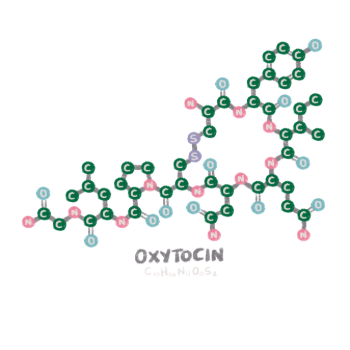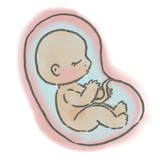How Oxytocin Affects Newborn Sleep
Oxytocin, the hormone produced by the hypothalamus in the brain and released by the pituitary gland, provides several health benefits including improving immune function, reducing stress levels and inflammation.
Also known as the 'sedation hormone' for its calming and relaxing effects, oxytocin can help babies feel safe and secure, thus helping to improve their sleep quality and duration. There are several ways to boost baby's levels of oxytocin, including:
Touch
Gentle touches, such as stroking or massaging your baby, can stimulate the release of oxytocin and increase a sense of calm and relaxation, thereby helping baby wind down and fall asleep faster.
Sucking
The act of sucking - whether it is a mother's breast, or a bottle, a pacifier, or one's own thumbs or fingers - has been proven to have a calming and soothing effect on babies, thereby helping to improve baby's sleep quality. In one survey, researchers found that babies who sucked on their own thumbs or fingers slept longer at night and experienced few night wakings. To support your newborn's self-soothing behaviours early on, allow your baby to get his/her hands to face and mouth as much as possible while swaddling.
Skin-to-Skin contact
Holding your baby close to your skin increases the release of oxytocin, which can help baby feel calm and drowsy, thereby inducing sleepiness. Skin-to-skin contact is a powerful tool for promoting better sleep in babies. This intimate form of bonding, where a baby is placed naked (or in only a diaper) on a parent's bare chest, offers numerous benefits that directly contribute to improved sleep quality and duration.
One of the primary reasons skin-to-skin contact enhances baby sleep is its ability to regulate the infant's physiological functions. When in close contact with a parent, a baby's heart rate, breathing, and body temperature stabilize. This regulation helps the baby feel more secure and relaxed, creating an ideal environment for restful sleep. This practice promotes feelings of calm and well-being, reducing stress and lowering cortisol levels in the baby.
Lower stress levels naturally lead to better sleep patterns and more time spent in deep, restorative sleep. Research has shown that babies who experience regular skin-to-skin contact spend more time in quiet sleep, which is crucial for brain development and maturation. This type of sleep is characterized by deeper, more restful periods that are essential for a baby's growth and overall health.
Moreover, skin-to-skin contact helps babies feel more secure and comforted, reducing crying and fussiness. This emotional regulation allows infants to settle more easily and stay asleep for longer periods.
For premature babies, the benefits are even more pronounced. Kangaroo care, as it's often called in neonatal units, has been shown to improve sleep quality, aid in weight gain, and may lead to earlier discharge from the hospital. This simple yet powerful practice can significantly improve both the quality and quantity of an infant's sleep, contributing to their overall health and development.


 New Zealand Dollar (NZD)
New Zealand Dollar (NZD)
 Hong Kong Dollar (HKD)
Hong Kong Dollar (HKD)
 Japanese Yen (JPY)
Japanese Yen (JPY)
 Singapore Dollar (SGD)
Singapore Dollar (SGD)
 South Korean Won (KRW)
South Korean Won (KRW)
 United Arab Emirates Dirham (AED)
United Arab Emirates Dirham (AED)
 Canadian Dollar (CAD)
Canadian Dollar (CAD)
 British Pound (GBP)
British Pound (GBP)
 Euro (EUR)
Euro (EUR)
 Swiss Franc (CHF)
Swiss Franc (CHF)
 Swedish krona (SEK)
Swedish krona (SEK)







